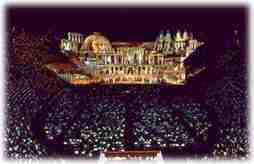Arena of Verona
 The Roman amphiteatre, the Arena of Verona is one of the greatest and most
prestigious archeological monuments in Europe. Built in the first century A.C. during the
last years of the emperor Augustus, it forms an ellipsis and is 138,77 m. long, from one
end to the other. On the inside the major axis is 73,68 m. long and the minor one is 44,53
m. long, while the auditorium has 45 steps with an average height of 45 cm.. From the very
beginning of its existence, the Arena of Verona has been a powerful and suggestive place
of entertainment: gladiatorial fights, jousts, tournemaments and nightly games took place
against a rich scenic background.
The Roman amphiteatre, the Arena of Verona is one of the greatest and most
prestigious archeological monuments in Europe. Built in the first century A.C. during the
last years of the emperor Augustus, it forms an ellipsis and is 138,77 m. long, from one
end to the other. On the inside the major axis is 73,68 m. long and the minor one is 44,53
m. long, while the auditorium has 45 steps with an average height of 45 cm.. From the very
beginning of its existence, the Arena of Verona has been a powerful and suggestive place
of entertainment: gladiatorial fights, jousts, tournemaments and nightly games took place
against a rich scenic background.
From the 18th century onwards, theatrical performances became a constant feature. The solemn Congress of the European Nations, which took place in Verona in 1822, deserves a speciam mention: on that occasion, Rossini composed and directed in the Arena the cantata "La Santa Alleanza" (The Holy Alliance), for all European sovereigns.
Today, the Arena of Verona is famous for being the most important contemporary "archeological theatre". The good state of preservation of the monument is clearly due to the way the monument has always been used; as it was in the past, the amphitheatre must also be in the future, an important place for culture, and a harmonious meeting point for society.
Today, all this is possible thanks to the annual Opera Festival organized in the amphitheatre. The first performance of the Festiva dates back to August 10th, 1913 when Aida by Giuseppe Verdi was performed.
Since then the Arena has been a centre of opera and has progressively improved in two respects: the artistic standard is high and performances are popular. The Opera Festival has had, and continues to have, some of the best artist in the world such as: Renata Tebaldi, Maria Callas, Mario del Monaco, Placido Domingo, José Carreras, Luciano Pavarotti, Jean Vilar, Franco Zeffirelli, Tullio Serafin, Riccardo Muti, Daniel Oren. The opera season of the Arena brings to Verona over half a million people every year, and over fifteen thousand specators flow into the amphitheatre every evening of the season: a cosmopolitan crowd, with people from both within and outside Europe.
This massive flux of spectators makes it possible to obtain considerable profits compared to the average incomes of other theatres around the world: the profits coming from the sales of tickets correspond to 60% of costs for organizing and promoting the performances, which is quite unusual for an opera theatre. the "Ente Lirico Arena di Verona" is the board that nowadays organizes and administers the Festival. Its permanent staff has about 300 employées, but in the summer period it has up to a thousand extra employées.
In fact, the Opera Board is the greatest outdoor theatrical production organization in Europe, an unique Phenomenon.